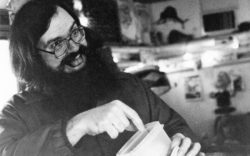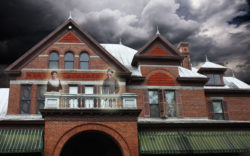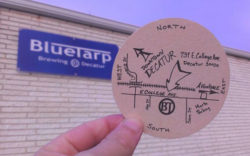Over the years, there have been quite a few records labels based in Georgia; only a couple were to have that coveted “hit” and become of enough magnitude to draw other potential hitmaking artists into the fray. I’ll make note of what I can remember, with help aplenty insodoing from Woggles drummer (and occasional Flagpole contributor) Kurt Wood.
The first record label in GA that ever had a national hit on its own was Chic records of Thomasville. They charted in 1957 with the song “Freight Train” by the Chas. McDevitt Skiffle Group (with vocal by Nancy Wiskey). This was a leased master from England’s Oriole records, and how it got from Jolly Old England to Thomasville, Georgia… well, your guess is as good as mine. Chic lasted for several years and had some amazing collectors’ item rockabilly records (including one by some guy from Manor, Georgia!) that sell for upwards of $100. Most of their releases were lame country and novelty stuff, however. The name of the singer on the McDevitt 45 is shown as “Wiskey” and “Whiskey” on the disc’s various pressings. After that, Bill Lowery established National Recording Company in Atlanta circa 1957 after he got tired of leasing all his masters to other companies (mostly Capitol and R.C.A.) and having those folks walk off with the bulk of the profits. Most of N.R.C.’s releases were regional hits, but a couple actually made the national charts. (A few, like “Springtime In Atlanta” by The Claire Rothrock Singers, sank like stones tossed into Lake Clara Meer.) Immediately to mind comes Joe South’s re-doing of J. P. Richardson (The Big Bopper)’s “The Purple People Eater Meets The Witch Doctor,” issued as N.R.C. # 5000. Joe, who was born Joseph Michael Souter, Jr., hailed from Covington, Georgia where he once deejayed for Radio Station WGFS. Another hit came from Ray Stevens, the favorite son of Clarkdale, Georgia 30020 (in Cobb County). Ray, whose real name is Raymond Steven Ragsdale, garnered attention with the novelty record “Sergeant Preston of the Yukon.” on N.R.C. He went on to lease further recordings to Mercury under a way-before-its-time agreement that gave him total artistic control. About that time, a wild young guitarist began recording for N.R.C. after a few semi-successes like “Your Money Makes You Pretty To Me” for Capitol. His name was Gerald Reed Hubbard, but you know him as Jerry Reed… and for such smashes as “Amos Moses.” Rest assured that he is a far finer guitarist (as a session man) than he is either a singer or a songwriter.
Ironically, N.R.C.’s biggest hit didn’t come from a Georgian! Just as Austin, Texas’ Zeitgeist (now known as The Reivers) came to dB Recs primarily on the strength of that label’s way of doing business, so was Cincinnati’s Anthony J. Bellusci moved to journey to Atlanta to record and issue his self-penned “Robbin’ The Cradle.” This was one of the biggest hits of 1959, and surely the only one to feature a singer-played accordion! N.R.C. had at least 70 more releases: some are pedestrian, but others are wild rockers, such as “The Cat” by Rod Willis (N.R.C. 020) and a couple of Paul Peek sides, one of which features the legendary Esquerita on a dementedly-pounded piano. These command close-to-insane prices. Lowery Music Company still operates out of a converted schoolhouse in the Brookhaven section of Atlanta that serves as offices and studios; N.R.C ceased operation as a label in the late 1960’s.
Peach Records operated out of several cities in Georgia, notably Louisville, Jefferson, Cleveland, and Douglasville. It was the brainchild of a disc-jockey who moved from radio station to radio station. One 45 by Lewis Pruitt on Peach commands a hefty $150 price tag: it is, of course, unfathomable killer rockabilly. Just about everything else is decent enough, but straight country to the max.
Athens even had its own labels. The first, in mid-1958, was Star-O Records. One of the principals in the company was late Athens attorney Guy B. Scott, Jr. Star-O had two releases: Wayman Parham’s “Hang Loose”/”Stranded” and Walt Benton’s “Dreams Don’t Cost A Thing”/”Do It Again.” The latter A-side was re-recorded by The Flat Duo Jets and is on one of their LPs. Walt Benton (with The Snappers backup band) went on to wax two sides for 20th Century Fox: “Big Wheel” and “Stuck Up.” This record is a prized item among rockabilly and collectors in Scandinavia especially, and also in Belgium. Walt hailed from up around Commerce, by the way. Most of these sides were recorded at The Georgia Center For Continuing Education. Star-O was nationally distributed by T.N.T. of San Antonio, Texas. Brad Forrester operated a makeshift studio out of his house at 735 Boulevard. The one single I recall was “Little Willie Joe” by The Jesters, who do reunion gigs from time to time (mostly when the students are gone).
Wes McKenzie and Jerry Connell put together Project 70 Sound Studios here, and Greenwood Records grew out of that. The bulk of their releases were Black gospel groups, but a 1966 issue featured U. Ga. letterman (Big) Ray Rissmiller doing the pairing “They Call Me (Big) Ray” and “Hide And Watch Me Now.” If you’re eternally diligent, a copy might surface sooner or later at The Potter’s House, but not to worry if you don’t find it.
Back to Our Capitol City, Gaye Records was first based in Decatur (Box 34) and later gravitated to a box at Station K in Atlanta. With a myriad of releases on itself and several subsidiary labels, Gaye is most noted for a stunning driving punker by Red Beard and The Pirates. They are worth a column unto themselves, but information on them is, in a word, nonexistent, as it is on the label. If you know anything, please write either me or Kurt Wood c/o Flagpole and we’ll get back to you
And without Kurt Wood’s help, this could not have been written. Thanks, guy. You are an inspiration to me.
I’ll stop here for this week: I think I see the #3 Auburn/Irwin bus coming, and I mustn’t be late. Next week, I’ll pick up where I left off with some more information about independent record labels, who ran them, and what they recorded. See you there.
Like what you just read? Support Flagpole by making a donation today. Every dollar you give helps fund our ongoing mission to provide Athens with quality, independent journalism.










